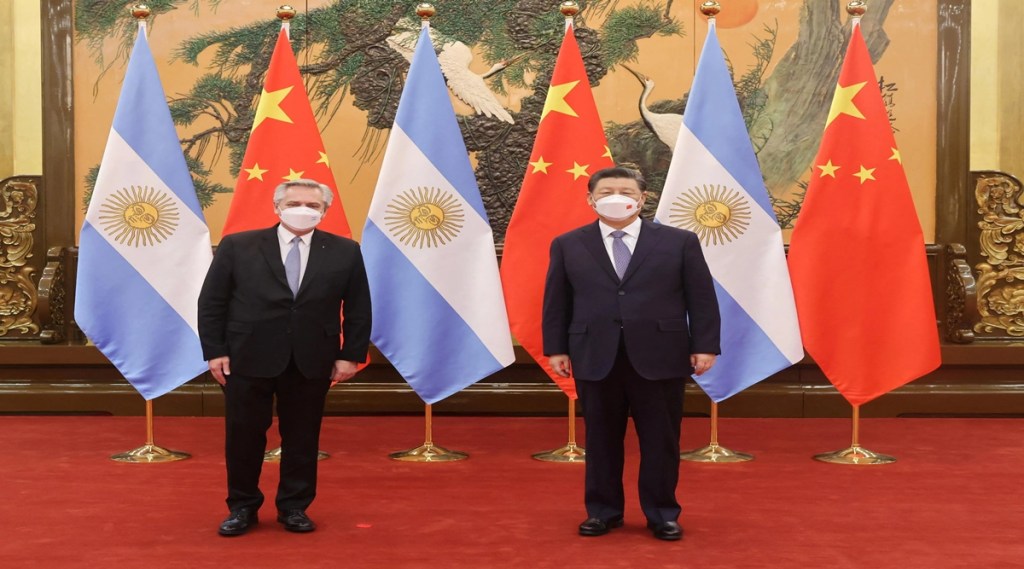By Dr Aparaajita Pandey
Alberto Fernandez has been a busy President as he battles the chasms in his party and a population that shows no overt signs of continuing popularity. It is perhaps a serendipitous co – incident that in 2020, China and Argentina celebrate fifty years of their diplomatic relations. In a trip to Beijing that was delayed due to Covid, Fernandez met with Xi for forty minutes and came out having signed a Memorandum of Understanding about Argentina playing a greater role in China’s trillion-dollar Belt and Road Initiative. Argentina will be a part of the maritime silk route belt which is being revived by the Chinese with massive infrastructural projects that connect the world in trade routes that have existed for centuries and are now being awakened.
It is not a surprise that Argentina would accept to be a part of the BRI in such an intrinsic manner. The Chinese have been making inroads into Latin America for over a decade and have established robust trade relations with the region. The trade between China and Latin America has shown a pattern of consistent and exponential growth. The Chinese influence is not limited to a singular sector either, and has infiltrated most sectors with security and defense, energy, and agriculture being some of the prominent ones. China has been a trade partner to most Latin American nations and has even fueled their economies with the commodity boom in China in the past. Argentina traditionally was the supplier of beef and soybeans to China, as their relationship has evolved, China has also become interested in the Argentine potential for shale as well as space cooperation. China already has an observatory set up in the Neuquen Province of Argentina. It is operated by the Chinese National Space Administration in collaboration with Argentina’s National Space Activities Commission. However, the observatory is said to be a part of the Chinese deep Space Network and the local populations around it are quite suspicious of the heavy security around it. The Chinese defense sales to the country also suggest an already present and thriving bilateral relationship between the two nations.
While the MoU has been signed recently both China and Argentina have been working closely together for decades, and with China willingly and heavily investing in nations that need an influx of capital, it usually captures the position of an obvious partner. The agreement between Argentina and China is about greater and deeper economic cooperation and integration in the infrastructure sector. The two countries have also agreed on building a five-year plan to focus on agriculture as well as diversification of trade between the two nations. It would be difficult for Argentina to refuse an offer of this kind since China is the largest trade partner for the country after Brazil. Argentina has also been going through considerable economic stress for the past few years.
It is also important to note that while South America had attempted to build an integrated infrastructure network for the region under an initiative by UNASUR which also had dimensions of integrated energy projects under IRENA; they could not achieve the kind of success that the UNASUR members had originally intended.
It is also a prudent move to indicate inflow of capital, progressive international engagements, as well as a promise of development of growth for Alberto Fernandez in this phase of his Presidential tenure. As mudslinging from his party continues and his support base shrinks; this MoU does show him in a better light for the people who ask for development and employment. This is not to say that there won’t be a deeper scrutiny of the Chinese proclivity towards debt trap diplomacy but there are very clear short – term benefits to the MoU. The visit to Xi was also a part of a larger tour where Fernandez also met with Putin. The meeting between Putin and Fernandez is being dubbed as warm and is being seen as a ‘door for Russia to enter Latin America in a more decisive way’.
It would be interesting to see how the rest of Latin America reacts to this agreement. Latin America is a region that is home to many countries that recognize Taiwan and as China becomes a greater economic presence one can see the shift towards Beijing from Taipei.
(The author is an Assistant Professor at the Department of Public Policy in Amity University and has a PhD in Latin American Studies from Jawaharlal Nehru University. Views expressed are personal and do not reflect the official position or policy of Financial Express Online. Reproducing this content without permission is prohibited.)


